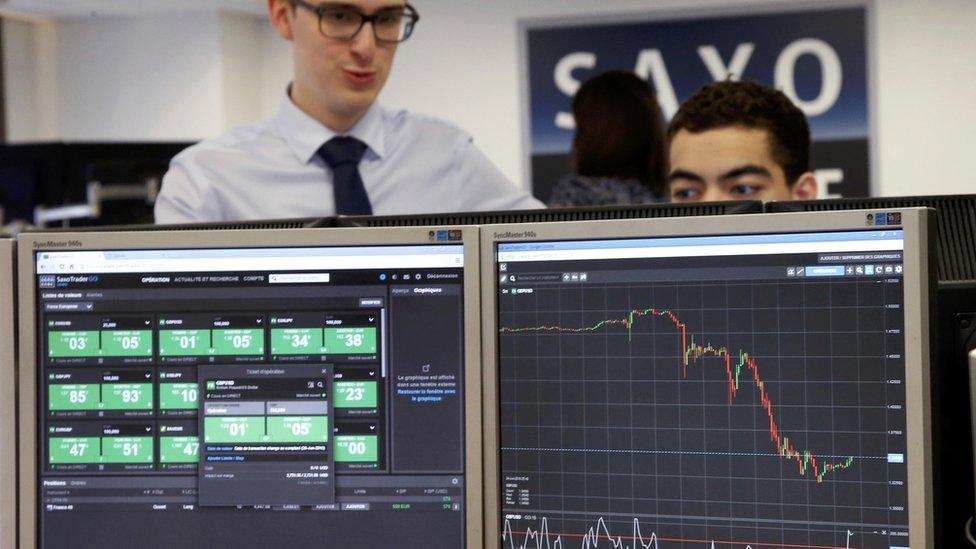Poundwatch: The view from Asia
- Published

The pound fell in the wake of the Brexit vote... and it's happening again
We've been here before. Think back to that fateful day in June when the world woke up to the fact that the UK had voted to leave the European Union.
Brexit's impact in Asia was dramatic, to say the least. Sterling slumped in Asian trade. Investors panicked and, as I said at the time, the uncertainty was only just beginning.
Fast-forward three months. The UK has a new prime minister, a new-ish government, and now a new time-line for when Brexit will begin.
So now that some of that uncertainty has been taken out of the equation, you would think that investors in Asia would breathe a sigh of relief?
Nope. While the pound hasn't dropped as dramatically this morning as on the day of Brexit, it has seen its value sink by about 0.5%.
And while setting a timeline for Brexit has certainly provided Asian businesses and investors with a sense of when the process of separating from the European Union will start for the UK, it still doesn't shine much light on what kind of Brexit this will be.
'Gateway' to EU
"Brexit is really important for investors in Asia," Deborah Elms, executive director of the Asian Trade Centre, told me. "Most Asian investors have routed their European investments through the UK. The UK market alone is not the reason these companies are in the UK."
That's not likely to come as a surprise for Prime Minister Theresa May and her government.
The Japanese government has already made it clear that Brexit could result in the country's firms moving their European head offices out of Britain. Japanese companies employ an estimated 140,000 workers in the UK and some of the biggest names in Japan Inc have their European HQs in London.
In a strongly worded letter, external, Japan's foreign ministry urged the UK to ensure that "Brexit negotiations are conducted through uninterrupted and transparent process" and to recognise the fact that one of the main reasons why Japanese companies invested in the UK was because the UK was "seen to be a gateway to Europe".
While transparency is what many in Asia have been calling for, Mrs May's government has consistently said investors must be patient.
But as Ms Elms told me, "If you're a business, you've been extremely patient, and now you want to know what the terms of Brexit are going to be."
Time to move?
Some Asian companies have read the prime minister's speech as an indication that the UK is more likely to be leaving the single market.
Analysts say that could mean that Asian companies headquartered in the UK may not be able to access Europe's free trade zone because the UK has lost membership to the single market - and that those Asian companies will now start looking at the two-year timeline more urgently with a view to relocating, according to Ms Elms.
"As an Asian business [in this scenario] you have no particular benefit from being in the UK rather than being located in Singapore and Tokyo," she theorised. "Most [Asian] firms would more likely relocate directly into the EU, but for some companies, coming back to Asia might make sense, especially in the medium term while this is all sorted out."
It is unlikely that these sorts of Asian considerations will be uppermost in the minds of the great and the good attending the UK's Tory party conference in Birmingham this week. But as Britain navigates a post-Brexit world, government leaders would be mindful to pay attention to what their counterparts and businesses in this neck of the woods are thinking and saying.
- Published27 September 2016
